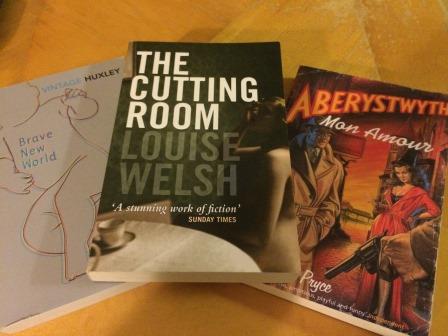
If you enjoy ambiguity and unreliable narrators, you’ll love this.
‘The Girl on the Stairs’ is Louise Welsh’s fifth novel but the first I’ve read (thanks book group!). After this, I’ll definitely be checking out her back catalogue.
What’s it about?
Heavily pregnant Jane has just moved to Berlin with her Lebenspartner. While Petra works, Jane explores her immediate environs and quickly fixates on her neighbours: a single father and his teenage daughter, Anna. After Jane hears the father screaming at his child she decides that the girl must be protected, whether she wants it or not…
What’s it like?
This is an engrossing psychological chiller with a not entirely likeable protagonist. *
Jane smokes, regularly risks her own safety and that of her unborn child and is often unnecessarily defiant. (‘Put that up your flue and smoke it’ she thinks as she informs the local priest of her gay relationship. And yet she somehow draws your sympathy despite herself. Using myriad small details Welsh subtly implies that Jane has been the childhood victim of male abuse and that this is where her desperation to save Anna springs from.
Is Jane starving herself into psychosis? Or is the doctor as dangerous as she believes?
Gradually the reader is drawn into an impenetrable puzzle. Is Jane reading Alban Mann and his relationship with his daughter inaccurately? If so, why doesn’t Anna simply deny it? Is Jane starving herself into psychosis? Or is the doctor as dangerous as she believes? Welsh’s skill can be seen in the way that, even at the end of the book, certain elements remain ambiguous. As the narrative perspective always follows Jane, it is impossible to know for sure what motivates any of the other characters.
Petra plays the pragmatic, reliable (very German!) foil to Jane’s emotional turmoil, (“All men pay for sex”,) but when Welsh removes her from the scene entirely (a week long work trip), all the tensions come bubbling to a head.
As the action became more dramatic, I was genuinely gripped by the developments and, although the reader can see far more clearly than Jane does, there are still some twists and turns in the final few pages. These are believable – and utterly chilling.
A controversial story?
One review I read surprised me by suggesting that this book pushed an LGBT agenda. I disagree entirely; the fact that Petra and Jane have a loving relationship is presented in a very similar way to other relationships in a similar position. They have sex, they argue, Jane sometimes resents Petra’s ability to work and earn money while she is expected to stay at home. Jane sometimes seems to anticipate trouble, (‘The taxi driver…didn’t say anything, not even when she took Petra’s face in her hands and kissed her on the lips’,) even possibly to almost desire it, but when abuse does come her way it’s obviously related to her investigation of her neighbours rather than a genuine anger at her sexuality.
On a different note, a feminist reader might be concerned by the implication that pregnancy can cause a woman to be emotionally unstable, even dangerously deranged. Unfortunately, it is a (slim) possibility so I have no problem with it being fictionalised. Jane is clearly not intended to be an everywoman.
Final thoughts
I’ve never been to Berlin so can’t comment on the accuracy of the setting but Welsh focuses primarily on Jane’s immediate surroundings and the claustrophobia of those is convincingly evolved.
The epilogue builds well on the chilling events of the final chapters and leaves the reader with a lot to think about.
I thoroughly enjoyed reading this book and will definitely be looking out for Welsh’s previous novels. Now the question is just where to start. Suggestions welcomed!
* I’m not suggesting that female protagonists should be likeable, or even that likeability is a particularly relevant assessment criteria when discussing fictional characters (see discussion here), but the fact remains that she is quite an ambivalent character.


